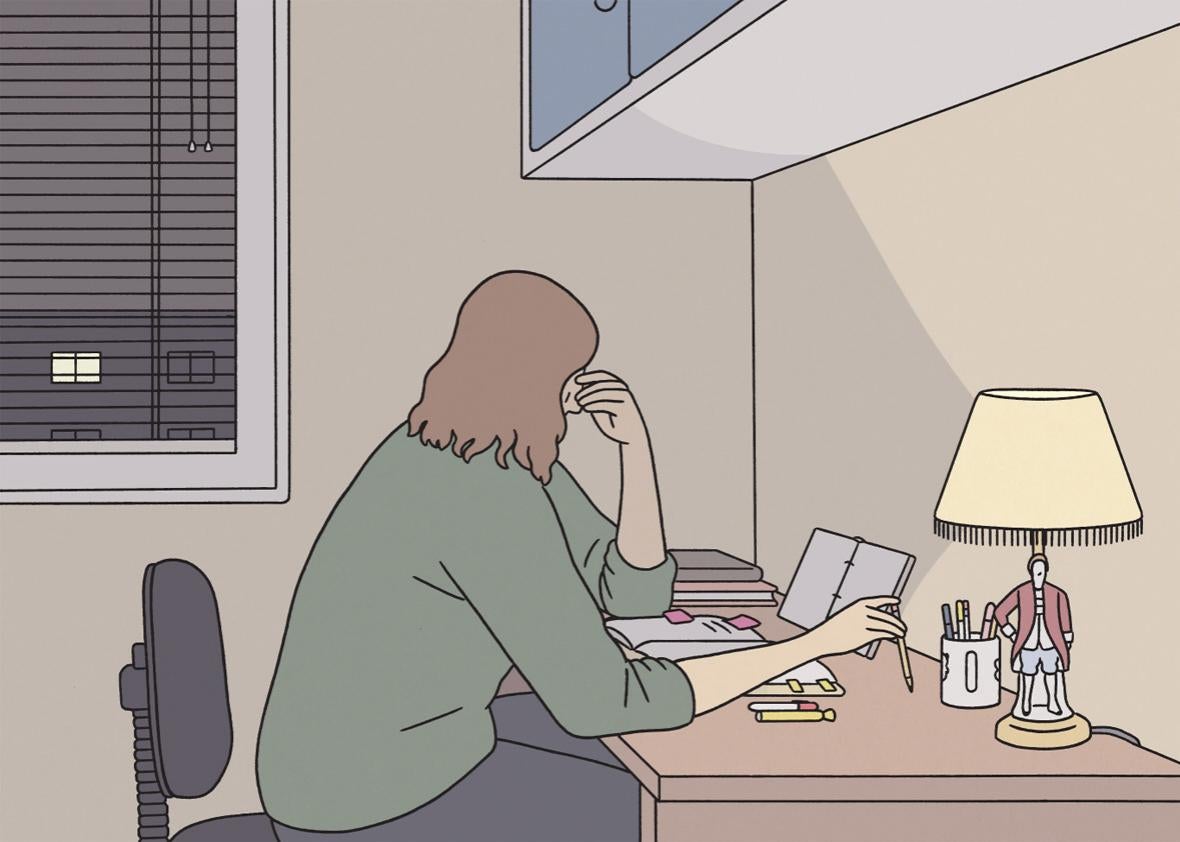Shira Greene, the 44-year-old narrator of Rachel Cantor’s second novel, Good on Paper, is not a new character. Since 2006, Cantor has published five short stories about Shira, a writer and translator who lives with her gay best friend, Ahmad, and her 7-year-old daughter, Andi, on the Upper West Side. (Some of them are available to read online, in full or in part.) Good on Paper, which follows Shira’s efforts to translate a book of poetry by a famous Italian poet in 1999, began as another story before swelling to a novella and then a novel. (Cantor actually wrote the manuscript for Good on Paper before writing A Highly Unlikely Scenario, the well-received 2014 sci-fi novel that was considered her debut.)
This fact—which I discovered only after finishing Good on Paper—might explain my impression while reading that Cantor was taking my interest in Shira’s life for granted. If I already knew and loved Shira and the other characters in her universe—Ahmad, the Pakistani professor whose wife and sons broke off contact with him after he came out; Jeanette, the bawdy real estate agent who gives Shira advice on dating and lingerie; Benny, the menschy rabbi and lit-mag editor who owns a bookstore across the street from Shira and Ahmad’s apartment—maybe reading Good on Paper would have felt like settling comfortably into a familiar armchair.
But on its own, Good on Paper is hard to get into. Not because the novel combines commentary on Dante’s early text Vita Nuova, exposition on translation theory, multifaceted interpretations of the Song of Solomon, and several offhand references to the German poet Paul Celan. Nor because of the fairly outlandish plot twist that begins to emerge about halfway through; it’s easy enough to suspend your disbelief for a writer as ebullient and fanciful as Cantor. No, my main issue with Good on Paper has to do with Shira, whose navel-gazing began to wear on me and whose narration is too blinkered to give the plot any semblance of momentum.
At the opening of Good on Paper, Shira, who abandoned her dissertation on Dante years ago and now temps for prosthetic leg companies and fragrance manufacturers, receives a telegram from Romei, a Nobel Prize–winning Romanian-Italian poet, asking her to translate his latest work into English. At first, Shira thinks one of her ex-boyfriends is playing a prank on her, but she eventually realizes this is the real Romei, who has read Shira’s translation of Dante’s Vita Nuova and is apparently impressed by her abilities. As Romei’s book, which tells the story of how he met his wife, Esther, trickles in via fax, Shira notices deliberate tricks and traps—false cognates, syllepses, paronomasia—that seem intended to trip up a translator. Meanwhile, the life she has built with Ahmad, whose name appears on Andi’s birth certificate even though he’s not her biological father, begins to fray as Shira gets closer and closer to the kindhearted Benny.
The story-within-a-story device means that most of the suspense of Good on Paper comes from Romei’s slowly unspooling book and its attendant mysteries: Why does the text seem deliberately difficult to translate? Why do the sections he faxes to Shira seem to allude to old stories and essays of Shira’s? Why did Romei choose Shira, anyway? Unfortunately, Cantor squanders many opportunities to play up the suspense, as when Shira tells instead of showing us that Romei’s pages contain “seven images and ideas familiar from my stories.” Plus, small inconsistencies emerge: Shira is hypersensitive to the nuances of Romei’s text, but she seems altogether too naïve about the personal questions Romei asks her during phone calls. And Cantor breezes through the exposition about how Romei found Shira so quickly that later on, when Shira has an epiphany about Romei’s path to her, I was just confused.
Shira’s real-life concerns are equally prone to narrative bumpiness. When Ahmad announces, out of the blue, that he wants to move from Manhattan to Connecticut, he suddenly morphs from supportive best friend to cruel, arbitrary oppressor. Neither Ahmad’s insistence on the move, nor Shira’s violent opposition to it, are ever fully explained. Ahmad and Shira’s backstory—they attended high school together in Rome, and their pasts are haunted by two absentee love-interest figures, Jonah and T.—is needlessly convoluted, but it doesn’t begin to explain the enmity they display during their geographical battle. Rather, it feels like Ahmad turns on Shira simply because Cantor needed to come up with a conflict to bring Shira’s demons to a head.

Bennett Beckenstein
The conflict between Ahmad and Shira isn’t merely contrived; it also makes both characters insufferable. The previously harmonious mother and father play tug-of-war over their daughter, and each commits unforgivable parenting sins in the process. It’s hard to focus on Shira’s budding romance with Benny, and the enigma of Romei’s text, when Shira and Ahmad are trading insults and taking turns isolating Andi from the other. When Shira casually disabuses Andi of the notion that Ahmad is her real father in an attempt to win her over, whatever empathy I’d felt for Shira more or less ran out.
If you’re generous enough to look past Shira’s terrible parenting, you’ll find some unique pleasures in Good on Paper. Cantor’s depiction of the coffee shops, bookstores, and parks of the Upper West Side in the late 1990s is richly textured and realistic. Cantor’s gift with wordplay imbues the book with energy; Shira brims with inspired coinages like “Cohn’s Cones koans” (Zen riddles about a local ice cream shop). And, not insignificantly, Good on Paper is a genuinely useful primer on the inherent challenges of translating poetry. Cantor drops useful tidbits like the fact that “Italian condenses at the rate of four English feet per line” and defines the Buber-Rosensweig approach to translation—always translating the same word the same way, so that words echo the way they were intended to. Shira’s project is an investigation into whether translation is really possible—whether a translator can ever truly capture the meaning and spirit of an original text—and Cantor elucidates this philosophical question masterfully.
Early on in Good on Paper, Shira tells us,
Translation requires, and generates, a rare kind of intimacy. Like sex done right, I’ve always thought. The translator makes a holy commitment to understand, to listen with all possible intensity, to step backward, ever backward, through the labyrinth of an author’s ideas and devices, uncovering his decisions and triumphs, line by line, until she arrives, finally, at the moment of creation. … It takes a strong stomach. And an attractive host. You had to want to get close.
A similar intimacy, of course, exists between writer and reader. And as enterprising and spirited a writer as Cantor is, Good on Paper didn’t make me want to get close to Shira.
—
Good on Paper by Rachel Cantor. Melville House.
See all the pieces in the Slate Book Review.
